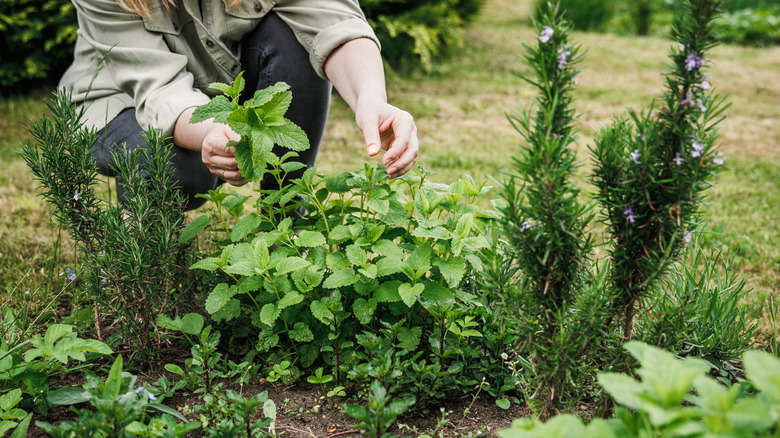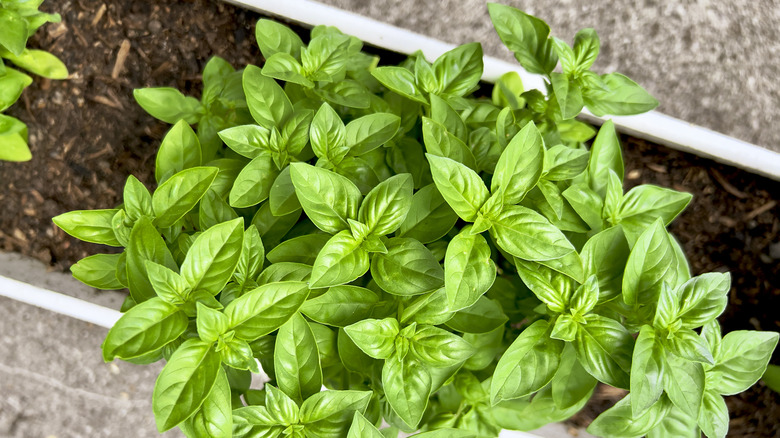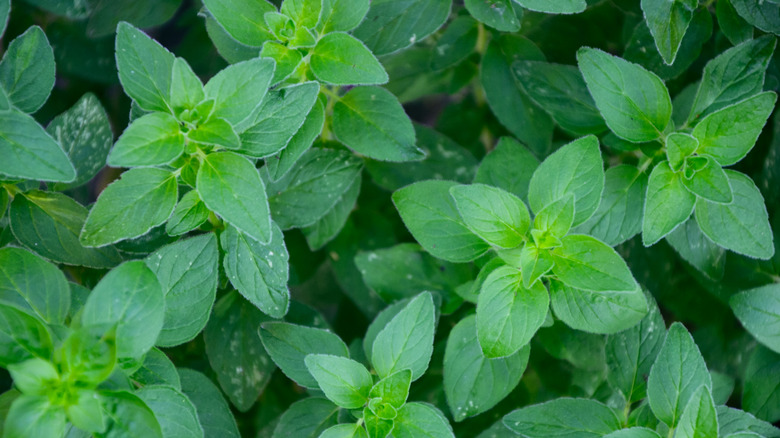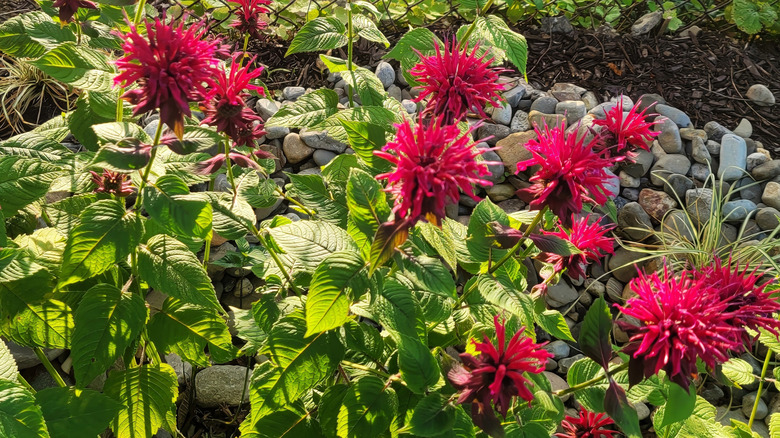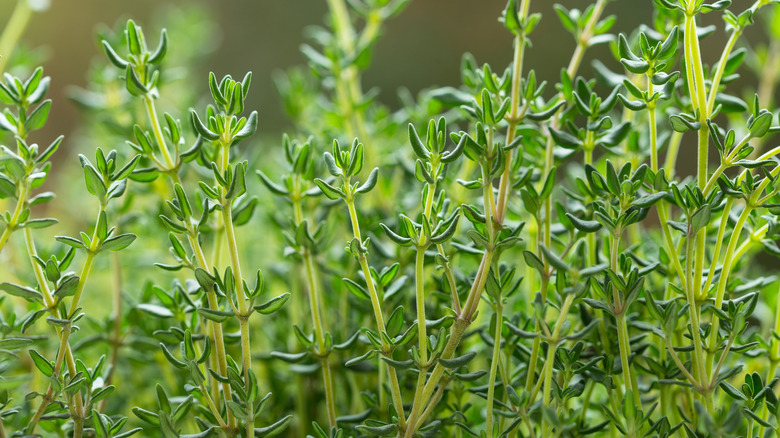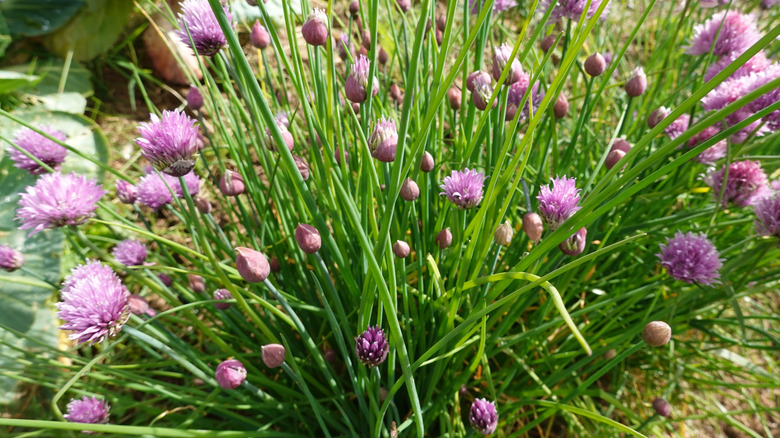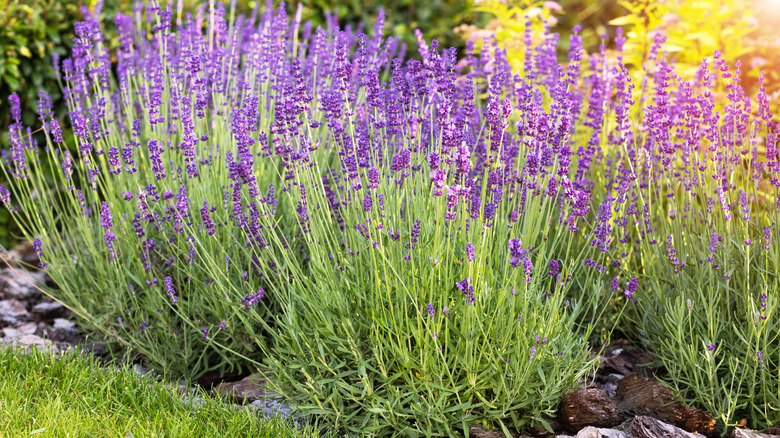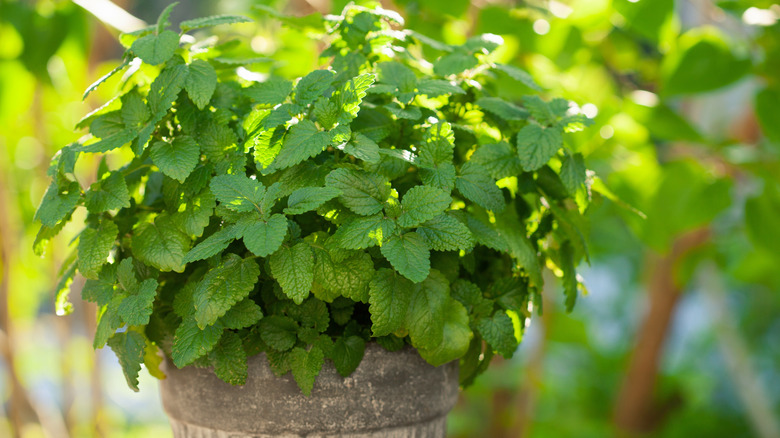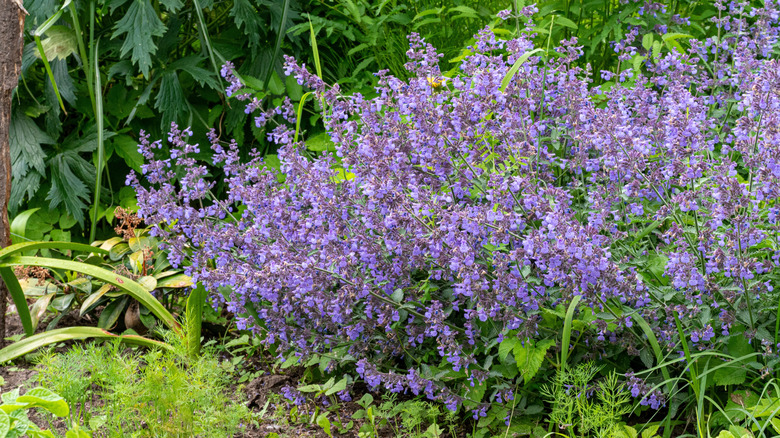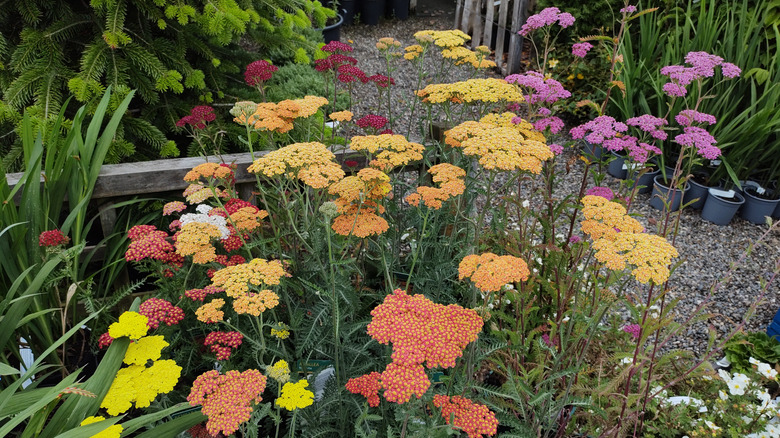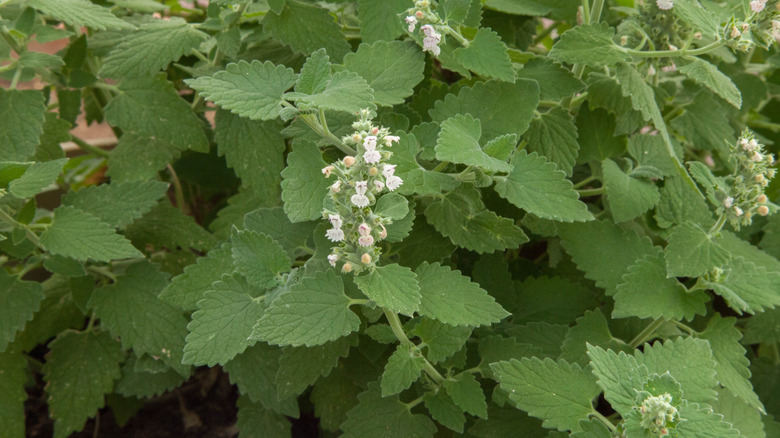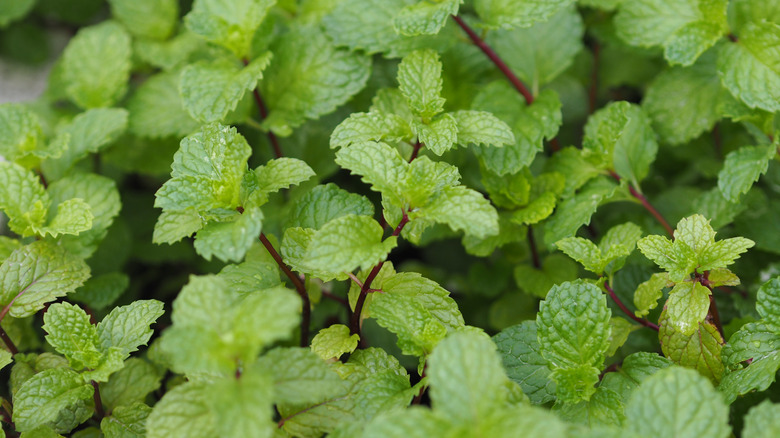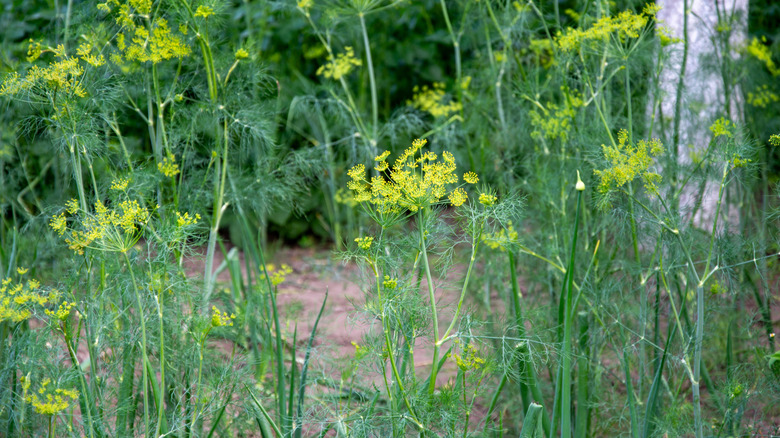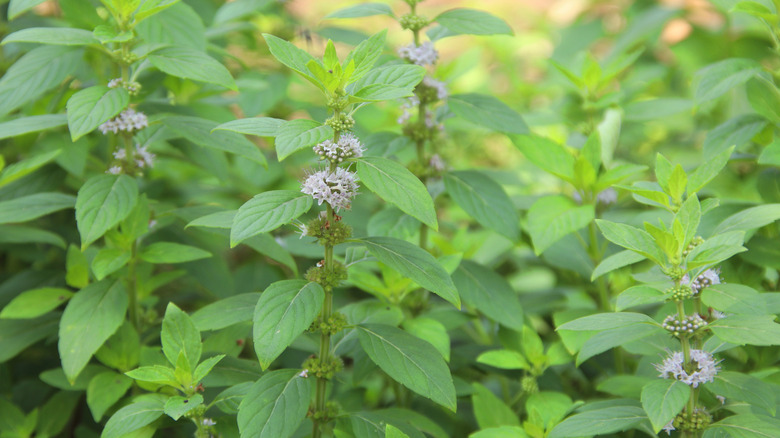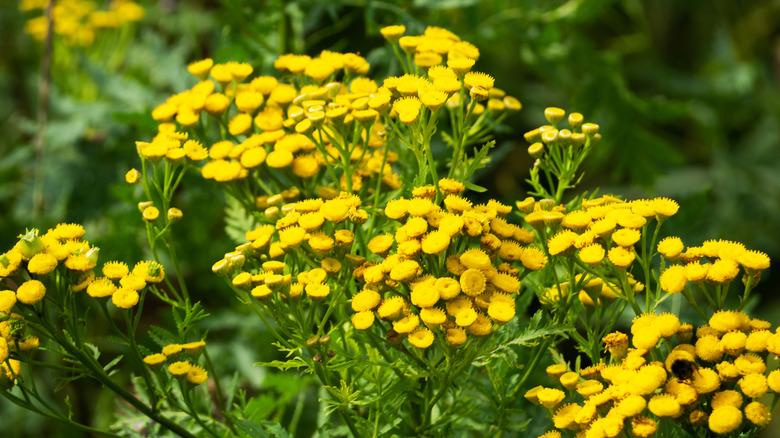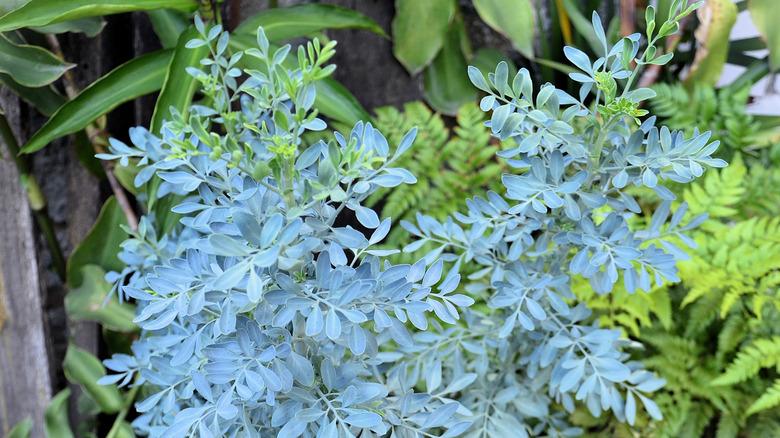15 Easy-To-Grow Herbs That Can Help Keep Pests Away From Your Yard And Garden
Gardening is a rewarding activity that also has its challenges, including finding ways to keep pests at bay. From rabbits and squirrels who nibble at veggies, to deer who eat flowers, to mosquitoes who bite, gardeners are faced with many potential wildlife pests that can damage plants or make the garden a less pleasant place to be. But luckily, there are some simple ways to help ward off various animals and insects. One great garden-friendly method of deterrence is planting easy-to-grow herbs in and around the garden.
The main property of herbs that helps repel certain pests is scent: Herbs with strong scents are often distasteful to various animals and insects and will keep them away. For example, a number of fragrant, fast-growing herbs help deter rabbits, including lavender, yarrow, and mint, because they dislike the smell. Another way that certain herbs can help deter insect pests is that they can attract beneficial insects that are natural predators of the less-desirable ones. National Garden Clubs, Inc. says that planting herbs to attract ladybugs (including dill, oregano, thyme, and yarrow) will help deter aphids in the vegetable garden.
The herbs listed here are all easy to grow from seed or by acquiring nursery plants. Most of these herbs can be grown as short-lived perennials, though some, like dill and basil, are more frequently cultivated as annuals. These herbs all like partial to full sun and well-drained soil, and will do well either in your garden beds or in containers. In addition to their culinary usefulness and beauty, as well as attracting pollinators with their flowers, these herbs can help with deterring various pests without the use of inhumane or toxic methods.
Basil
Basil's (Ocimum basilicum) wonderful herby fragrance makes it a favorite in the herb garden. The strong scent helps to keep flies and mosquitoes out of the garden, and also repels various insects that feed on fruits and vegetable plants like aphids, tomato hornworms, and thrips. Basil is a tender perennial in USDA Hardiness Zones 10 and 11, but easily grown as an annual from seed; direct sow after last frost, in beds or containers. Snipping off the flowers will help the leaves grow fuller, but leave a few flowering stems intact to attract beneficial pollinators.
Oregano
Oregano (Origanum vulgare) is a perennial herb (hardy in Zones 4 through 10) that will form large clumps in the garden once established. It can be grown from seed, or you can purchase a plant and add to your herb beds. Oregano is a popular culinary and medicinal herb that produces tiny flowers which attract beneficial pollinators. The strong scent also repels certain insects that attack vegetable plants, like cabbage butterflies and cucumber beetles.
Bee balm
Bee balm (Monarda didyma), also known as wild bergamot, is a vigorous perennial that is easy to grow in Zones 4 through 9. It likes full sun and tends to spread quickly in the garden. The colorful, spiky flowers are rich with nectar and attract many pollinators including bees, butterflies, and hummingbirds. The plant's herby, minty fragrance also helps to repel certain pests, including mosquitoes, and unlike some insect-repelling plants, it's not necessary to crush the leaves to release the essential oils as the scent is strong enough on its own.
Thyme
Thyme (Thymus vulgaris) is a low-growing perennial herb that produces tiny leaves on sprawling stems. It's cold hardy in Zones 5 through 9, and plants will usually develop a bush-like habit and woody stems after they're established. In addition to attracting pollinators with its tiny fragrant flowers, thyme repels harmful insects that devour vegetables, including cabbageworms, cabbage loopers, whiteflies, and tomato hornworms.
Chives
Most alliums including garlic and onions have strong scents that will deter insects and mammalian pests from the garden. Chives (Allium schoenoprasum) have these properties too, and are generally much easier to grow than onions or garlic. Rabbits dislike their strong odor, as do Japanese beetles, aphids, and carrot flies, so chives are a good all around herb to grow in the garden. The pale purple spiky flowers are attractive, and bring in bees and butterflies. These clumping perennials, easy to grow from seed, are cold hardy in Zones 3 through 9.
Lavender
Lavender's (Lavandula spp.) fragrant flowers are useful for many purposes, and in the garden they are an excellent pest deterrent, warding off deer, rabbits, and mosquitoes with their heady perfume. Though lavender can be grown from seed, planting nursery plants ensures you will have flowers the first year. Lavender plants are easily grown in well-drained, sandy, slightly alkaline soil, and they prefer dry summers to high humidity. Choose lavender plants appropriate to your growing zone: Spanish lavender varieties need warmer temperatures than English or French lavenders, which are mainly hardy in Zones 5 through 9.
Lemon balm
Lemon balm is a versatile culinary herb with a delicious citrusy fragrance that is an effective insect deterrent. Crushing the leaves and rubbing them lightly on your skin helps keep mosquitoes away, and planting lemon balm in the garden will deter them all season long. The tiny flowers also attract helpful pollinators. Because this plant has the potential to spread aggressively, many gardeners choose to grow lemon balm in containers. This fragrant herb is a cold-hardy perennial (suitable for Zones 3 through 7), but can also be easily grown in containers from seed as an annual.
Flowering catmint
This vigorous perennial forms large clumps in the garden and produces dramatic spikes of pale purple flowers that bloom for weeks. The nectar-rich flowers attract all kinds of pollinators, including hummingbirds, and their fragrance is a very effective mosquito deterrent. Catmint (Nepeta x faassenii) comes in a number of attractive cultivars, is easy to grow in full sun with well-drained soil, and is cold hardy in Zones 4 through 9. It's related to catnip, but its scent is slightly less alluring to cats.
Yarrow
Though it's generally considered to be a perennial flower in Zones 3 through 9 and is often seen in cottage gardens, yarrow (Achillea millefolium) is technically an herb with many medicinal uses. The flat flower heads add weeks of color to the garden, and there is a wide range of cultivars available. Yarrow contains various natural compounds that emit a strong fragrance. This scent naturally repels mosquitoes, but attracts beneficial insects like ladybugs and butterflies.
Catnip
Catnip (Nepeta cataria) is related to flowering catmint, but has less dramatic flowers and tends to spread a bit more aggressively in the garden. It's a vigorous, drought-tolerant perennial (hardy in Zones 3 through 9), and the tiny white flowers attract bees and butterflies. The strong scent of catnip may be intoxicating to cats, but it is repellent to various insect pests including mosquitoes and cockroaches, as well as vegetable garden pests like weevils, cabbage loopers, cucumber beetles, and squash bugs.
Mint
Mint plants are loved for their fresh scent and culinary uses. Mint keeps squirrels at bay with its strong scent, and it repels many biting insects. Grow it to keep them at bay; you can even crush the fragrant leaves and rub them on your skin to utilize its insect-repelling properties. Many mint varieties can be invasive in the garden, so it's a wise decision to plant it in pots. Both peppermint (Mentha x piperita) and spearmint (Mentha picata) are robust, grow easily in pots, and are hardy in Zones 5 through 9.
Dill
Dill (Anethum graveolens) has a unique and strong fragrance that many associate with their favorite kind of pickle. It one of several strong-smelling herbs that can help keep deer away from plants they tend to eat (like your rhododendrons and roses). It grows very easily and quickly from seed, and can be directly sown in the garden or grown in containers. It's typically grown as an annual, but dill may also reseed in the garden if the seed heads are not trimmed back in the fall.
Pennyroyal
Pennyroyal (Mentha pulegium) is a medicinal herb that is not generally recommended for internal use due to its toxicity, but it's known to be an effective insect repellent. Its strong scent repels various pests including ticks, fleas, and ants. When the leaves are crushed and rubbed on the skin, their oils can repel biting insects like mosquitoes and chiggers. Pennyroyal can be toxic to cats, so it should not be planted in gardens that cats have access to. It's hardy in Zones 6 through 9, and is usually grown as an annual from seed in northern climates.
Tansy
Tansy (Tanacetum vulgarum), also known as bitter buttons, produces bright yellow flowers in summer that look — fittingly — like tiny buttons. Its fragrance deters many insect pests that are a nuisance in the vegetable garden, including cutworms, asparagus beetles, cabbage maggots, squash bugs, and Japanese beetles. This perennial herb is hardy in Zones 3 through 9 and will grow in partial shade. Tansy can be toxic if eaten by livestock, so it should not be planted anywhere near places where livestock are kept to avoid any risk.
Rue
Rue (Ruta graveolens) is an attractive herb with blue-green leaves and yellow flowers in summer. It's valued for its insect-deterring qualities and is often planted near roses to repel pests including ants, ticks, and Japanese beetles. Rue can also be planted near raspberry plants to repel aphids. It should not be planted near cucumbers, cabbage, basil, or sage as it can inhibit their growth. It's a short-lived perennial hardy in Zones 4 through 10, but due to its potential toxicity when ingested by humans or animals, it should be grown with care.
